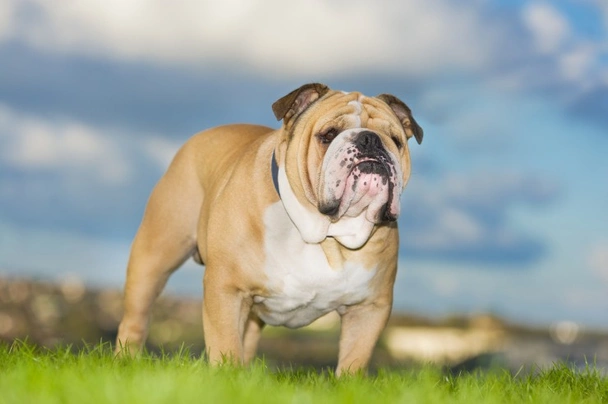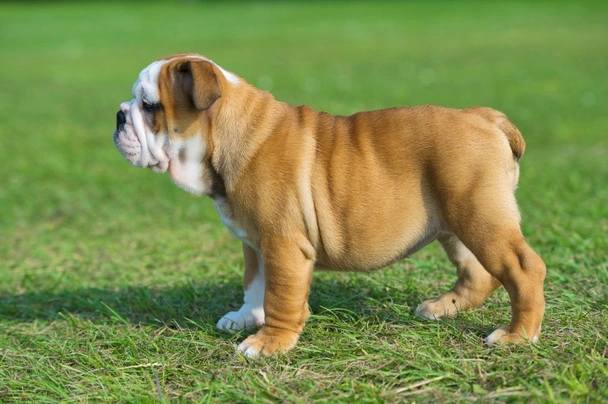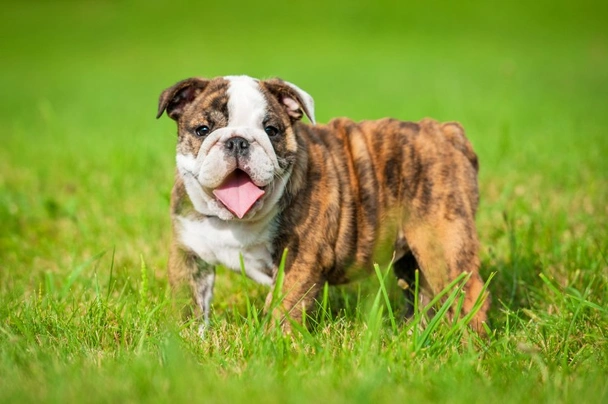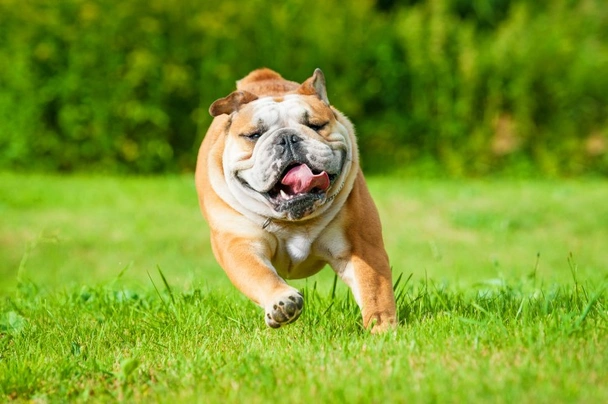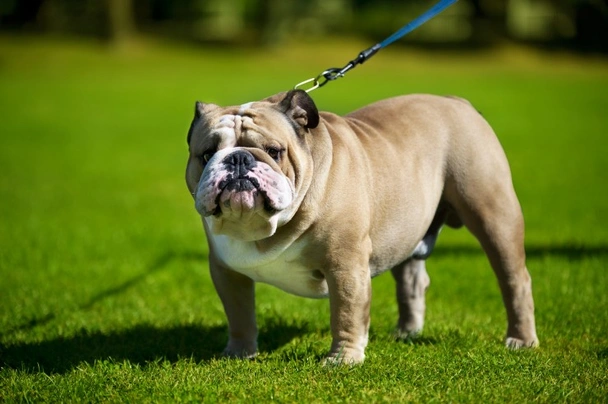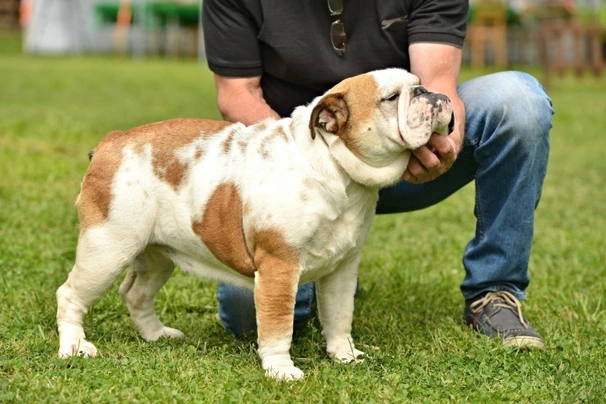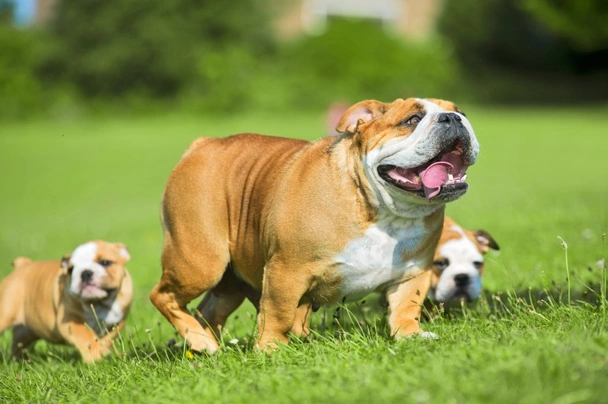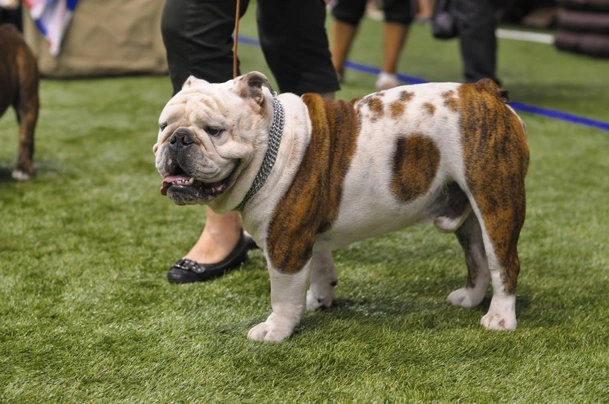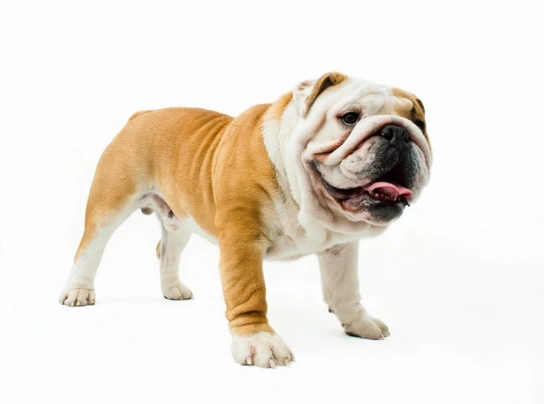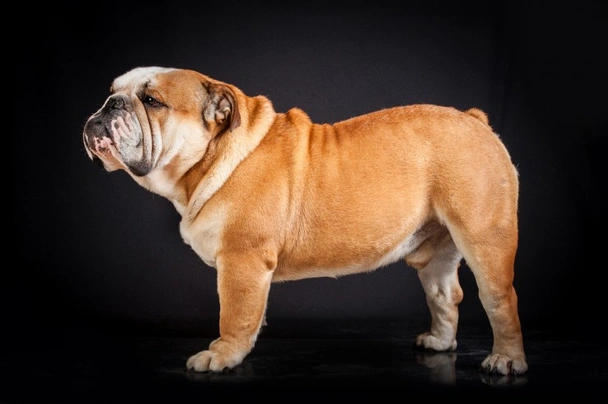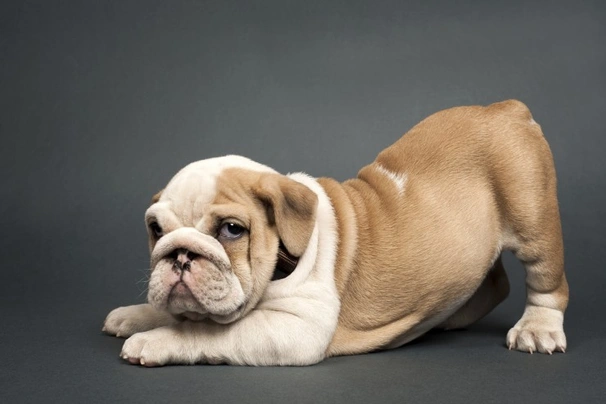English Bulldog
Pros
Cons
Introduction of the English Bulldog
Among the oldest breeds native to the UK the English Bulldog is considered a national treasure. In fact the breed is Great Britain's National dog known the world over as the personification of determination as well as being a constant reminder of the legendary John Bull. The shorter faced and squatter dog we see today came about in the mid eighteen hundreds and English Bulldogs first appeared in the show ring in 1860.
Considered to be a wonderfully gorgeous yet an ugly looking dog the Bulldog is among one of the most popular choices of family pets and companions due to their delightfully kind and loving natures. They are especially tolerant and patient when they are around children of all ages although they can get a little protective of them. The English Bulldog is a comical character yet they can be extremely dignified too which are just two of the traits that make the breed so endearing to owners and why they are among the most popular breeds in the UK being thought of as the country’s national treasure.
History of the English Bulldog
The sport of bull baiting was introduced to the British Isles in the 12th Century by the Normans. At the time they used mastiff-type dogs and for centuries the sport became popular with all classes of people throughout the land. It was around this time that smaller thicker-set dogs with extremely powerful jaws and strong heads started to replace the leggier and taller mastiff-type dogs. It is these shorter powerful dogs that were to become the ancestors of the English Bulldogs we see today.
By 1835 bull baiting was outlawed as a sport which meant the future of Bulldogs was uncertain. Fortunately a few of them were kept as companions and it was these dogs that were to become the foundation and regeneration of English Bulldogs ensuring the breed survived. The original Old English Bulldog was to outlive the breed's usefulness in England but they were saved from vanishing altogether by emigrants who took their dogs to the New World where they were used to round up wild bulls so they could be safely fenced off in areas away from towns.
The breed continued to be promoted by Bill George and other enthusiasts who began developing and improving them by crossing Old English Bulldogs with Pugs. The result was a much friendlier and less aggressive character that made for a loyal companion and great choice as a family pet. It was not until the late 1800s that the breed was recognised by the Kennel Club. Today the English Bulldog is as popular in other countries of the world as they are in their native UK thanks to the efforts and careful selective breeding standards employed by well established reputable Bulldog breeders.
Interesting facts about the breed
- Are English Bulldogs a vulnerable breed? No they are one of the most popular in the UK and elsewhere in the world
- English Bulldogs are thought as a national treasure
- They are one of the UK’s oldest breeds
- The Bulldog is a brachycephalic (short faced) breed
- The modern Bulldog is different to the original dogs that were used in blood sports
- Care should always be taken when an English Bulldog travels on a plane because they suffer from breathing issues
- A large percentage of Bulldogs (80%) are delivered by Caesarean section thanks to puppies having such large heads
- They are the 6th most popular breed in the UK
- Winston Churchill owned a Bulldog called Dodo
Appearance of the English Bulldog
Height at the withers: Males 31 - 40 cm Females 31 - 40 cm
Average Weight: Males 24 - 25 kg Females 22 - 23 kg
The English Bulldog is a proud and noble dog if somewhat delightfully 'grumpy' looking character. They are powerful smooth coated dogs that boast being thick set broad and compact standing low to the ground. The large face and head of the English Bulldog is its defining physical trait this together with their very pronounced undershot jaw with canine teeth pointing upwards and which are usually very visible make the Bulldog one of the most recognised dogs in the world.
The folds of skin around their faces and noses are large with the conspicuous folds being called 'ropes' over their black noses. The skin around the mouth droops downwards hanging under the neck giving the British Bulldog their famous 'sourpuss' expression. Their snout is short but should never be too short that it causes a dog to have difficulty in breathing. The English Bulldog is a brachycephalic breed and any exaggerated physical traits which includes shorter faces and muzzles would make breathing that much harder for them especially during the warmer weather.
A Bulldog's eyes are set low and wide apart being round and medium in size. Their eyes should never protrude or be sunken and they should be quite dark in colour leaning towards black showing no white at all when a dog looks straight at you. Their ears are set high and wide apart falling neatly down each side of a dog's head yet as far away from their eyes as possible.
Their body is powerful and muscular with their hindquarters being higher than their forequarters and strong looking. Their chests are wide and deep with broad shoulders and these dogs are quite short backed. One distinctive characteristic of the breed is their slightly arched back. Tails are set low always jutting outwards before dropping downwards and are average in length leaning towards shorter rather than longer but never docked.
When it comes to coat the Bulldog boasts a short coat over their entire body that's fine in texture smooth and close-lying but never wiring. The recognised Kennel Clubs colours can be whole or smut which includes the following:
- Brindle
- Brindle & White
- Fawn
- Fawn & White
- Fawn Brindle
- Fawn Brindle & White
- Red
- Red & White
- Red Brindle
- Red Brindle & White
- Red Fawn
- White
- White & Brindle
- White & Fawn
- White & Red
Important note about Merle colouring in English Bulldogs
The merle colour is not a naturally occurring colour in English Bulldogs and when dogs are bred to have this colour they are more at risk of developing the health issues associated with the merle gene namely problems with their hearing and vision. As such merle English Bulldog puppies cannot be registered with the Kennel Club because of the health concerns which affect both a dog's eye sight and their hearing.
Gait/movement
The way an English Bulldog walks is quite unique because they take short quick steps on the tips of their toes without lifting their back feet very high off the ground so they seem to just skim the ground they are walking on. They also hold a shoulder slightly more advanced than the other one. English Bulldogs must move soundly which is deemed very important to their breed standard.
Faults
Male English Bulldogs should have two normal testicles fully descended into their scrotums and if they are not this is considered a fault.
The sizes given in their KC breed standard are a guide of how tall and how heavy an English Bulldog should be. As such some dogs can be shorter or taller and they can be lighter or heavier than stated in their KC breed standard.
Temperament of the English Bulldog
The English Bulldog may look intimidating but quite the opposite is true. They are known to be among one of the most gentle loyal alert and courageous dogs on the planet which is why they are such a popular choice as family pets. They are known to be exceptionally tolerant and kind when they are around children too although they can become a little protective of them.
They are known to have a bit of a stubborn and determined streak in them which needs to be overcome during their training. They will not give up easily which means they can be a little persistent at times. Bulldogs crave being around people and they thrive when they get to spend as much time as possible with their owners. However they need to know who is the "alpha dog" and need to be reminded of this on a constant basis or they may start to show a more dominant side to their characters which is something to be avoided at all costs. As such an English Bulldog is not the best choice for first-time dog owners because they may get the better of their masters if not given the right signals as to who is the "boss" in a household.
These dogs like many other breeds are not fond of being left on their own for longer periods of time. If they do find themselves alone they can develop some unwanted and destructive behavioural problems. In short the English Bulldog prefers the company of people than being left to their own devices which can lead to a dog suffering separation anxiety.
When young the Bulldog can be quite an excitable character but they tend to calm down as they mature. Providing they have been well socialised as puppies they are generally very good around other family pets and animals. With this said some Bulldogs can be a little aggressive when they first meet other dogs especially if they do not already know them.
One trait that's worth making a note of is that Bulldogs are notorious for snoring due to their flatter faces and snouts. But one myth that needs dispelling is that these dogs drool copiously which they do not. The only time a Bulldog would really slobber is after they have had a drink of water or when they are waiting in anticipation for an owner to put their food bowl down on the ground for them.
Another thing worth making a note of is that if allowed a Bulldog would happily turn into a couch potato which in short means they need to be given regular daily exercise and to be fed a good quality diet to suit their ages. If not these dogs will plough on the pounds and it could lead to them developing all sorts of health issues which could shorten their lifespans considerably more especially if allowed to become obese.
Are they a good choice for first time owners?
English Bulldogs are not the best choice for novice dog owners because they are better suited to people who are familiar with their needs and who understand that these charming dogs can be wilful and stubborn when they feel like it. In short it takes time patience and understanding to train an English Bulldog and if they are allowed to get away with too many things they can start showing a more dominant side to their natures which makes them a lot harder to manage and live with.
What about prey drive?
English Bulldogs are courageous by nature and will stand their ground when they feel the need. However they do not possess a terribly high prey drive although it would be a mistake to trust a dog not to chase a cat or smaller animal they have never met before if and when they happen to meet.
What about playfulness?
English Bulldogs are known for their comical personalities and they thoroughly enjoy keeping their owners entertained. Puppies can be extremely boisterous during playtime but they tend to settle down as they mature into adult dogs. With this said an English Bulldog retains a fun-loving side to their natures well into their senior years which is why they are such a joy to have around.
What about adaptability?
English Bulldogs are adaptable by nature and providing they are given enough mental stimulation and daily physical exercise they are just as happy living in an apartment in town as they are living in a house in the country.
What about separation anxiety?
English Bulldogs form strong bonds with their owners and their families which means they are never happier when they are people around. They get stressed when they are left on their own for any length of time which often sees these dogs suffering from separation anxiety. Anyone wanting to share a home with an English Bulldog who knows they are going to be out of the house for longer periods of time would need to train their dog that being left alone is not something to be anxious about. With this said English Bulldogs are better suited to households where one person stays at home when other people are out.
What about excessive barking?
English Bulldogs are not known to be "barkers" but would be quick to let their owners known when they are strangers about or if something is happening in their environment that they don't like. With this said if a Bulldog is left to their own devices and not given the right amount of mental stimulation and physical daily exercise they are more likely to bark but only because they are stressed out.
Do English Bulldogs like water?
English Bulldogs don't mind being around water but care should always be taken when they are allowed to play anywhere near it and they should never be left unattended because they are not good swimmers and if they inhale too much water it could prove fatal. They are not designed to swim thanks to their heavy bodies short legs and large heads but a Bulldog would happily get their feet wet in a paddling pool when the weather is hot.
Are English Bulldogs good watchdogs?
English Bulldogs are not the best watchdogs but they will bark when someone comes to the door or if they don't like what is happening in their environment to let their owners know something is going on that is disturbing them.
Intelligence / Trainability of the English Bulldog
English Bulldogs are known to be intelligent dogs but with this said they have a bit of a stubborn streak and therefore they are not that easy to train. However in the right hands and with the correct amount of training and patience it is possible to train them. The trick is to be consistent and start their education when dogs are still young bearing in mind that English Bulldogs respond well to voice commands. Any harsh training would not be very successful and the same can be said of commands given in a harsh way. These dogs really do not like being shouted at preferring to end a training session so they can hide away totally ignoring an owner.
As previously mentioned their training must start early before an English Bulldog has the chance to pick up any bad habits which could prove very challenging to remedy when a dog is that much older. It's crucial for these powerful dogs to learn the basic commands early in life bearing in mind that English Bulldog puppies are boisterous and even when young can be a little stubborn and wilful at times. The first commands they should be taught paying particular attention to the recall command are as follows:
- Sit
- Stay
- Come
- Wait
- Leave
- Quiet
- Bed
Children and other
The English Bulldog is renowned for being extremely tolerant and good around children of all ages. However because they are such heavy dogs it's never a good idea to leave toddlers and Bulldogs together unsupervised. They can become very protective over family and children which means you need to keep an eye on things when other people are about. The other thing to bear in mind is that English Bulldog puppies play hard and they can be very boisterous which means even when young they could easily knock over a toddler or younger child albeit by accident and injure them.
If well socialised as puppies Bulldogs generally accept being around other animals and family pets including cats although it's always a good idea to keep a watchful eye on things when Bulldogs meet other animals for the first time just to be on the safe side.
Health of the English Bulldog
The average life expectancy of an English Bulldog is between 8 - 10 years although some dogs have been known to live longer especially when properly cared for and fed an appropriate good quality diet to suit their ages.
The Bulldog is a brachycephalic (short faced) breed due to their flatter faces and shorter muzzles. As such care must be taken when they are exercised especially during the hotter summer months of the year when a dog might overheat very quickly and easily. These dogs need to be kept in a cool and shaded area when the temperatures rise or they might develop hypothermia.
English Bulldogs are known to be one of the breeds that suffer the most from Hip Dysplasia and have the worst of all scores among breeds tested by the British Veterinary Association and Kennel Club's scoring scheme. Other health issues that affect the breed but to a lesser extent include the following:
- Patellar luxation
- Interdigital cysts
- Cherry eye
- Allergies
Bulldogs are also predisposed to certain hereditary and congenital health conditions which includes the following:
- Hyperuricosuria (HUU) - DNA test available
- Acne
- Fold dermatitis
- Folliculitis
- Furunculosis
- Muzzle pyoderma
- Demodicosis or demodectic mange
- Tail fold dermatitis
- Cataracts
- Distichiasis
- Entropion(Eyelids Folding Inwards )
- Ectropion( Eyelids Roll Outwards )
- Abnormal dentition
- Cleft lip/harelip
- Cleft palate
- Elongated soft palate
- Brachycephalic upper-airway syndrome
- Hypoplasia of the trachea
- Mitral valve defects
- Arteriovenous fistula
- Pulmonic stenosis
- Von Willebrand's disease
- Hydrocephalus
- Oligodendroglioma
- Perianal gland tumour
- Hypothyroidism
It's worth noting that over 80% of all Bulldogs puppies are born via caesarian section. This is due to the unusually large heads that puppies have which makes it hard for dams to give birth naturally. As such birthing needs to done by a qualified vet to ensure nothing goes wrong during the birthing.
More about brachycephalic breeds
English Bulldogs being a brachycephalic breed means they have flatter faces and shorter muzzles than many other breeds. The shape of their heads and muzzles puts them more at risk of suffering from specific health issues which includes having difficulty breathing. Other health concerns often associated with brachycephalic dogs include the following:
- Skin issues thanks to the folds of skin found around the front of their faces which create the perfect environment for a bacterial infection to take hold
- Dental issues - dogs like the English Bulldog often suffer from problems with their teeth because of their jaws are that much shorter than other breeds. The problem is that there is just not enough room in a dog's mouth to accommodate all their teeth and as such they become overcrowded causing gum and dental problems
- Eye issues which is caused by shallower eye sockets which some brachycephalic dogs have and the result is that their eyes protrude that much more. This puts them more at risk of suffering injury or trauma to their eyes
What about vaccinations?
English Bulldog puppies should have had their first vaccination prior to being sold. After this they need to be vaccinated again following the guidelines below:
- 10 -12 weeks old bearing in mind that a puppy would not have full protection straight away but would only be fully protected 2 weeks after they have had their second vaccination
There is some debate as to whether boosters are necessary so it’s worth discussing this with a vet before making a final decision. With this said any Bulldog going into boarding kennels would need to have all their vaccinations up to date.
What about spaying and neutering?
Female English Bulldogs can be spayed when they are 6 months old and not beforehand. Males can be safely neutered when they are 6 months old too.
What about obesity problems?
English Bulldogs are known to like their food with some dogs liking it a little too much which means they are at risk of putting on too much weight especially if they are not given the correct amount of daily exercise. It's essential for owners to keep a close eye on their dog's weight and to adjust their calorie intake and to up their exercise accordingly if they notice their pet is getting too heavy bearing in mind that Bulldogs are heavy built dogs in the first place.
What about allergies?
As previously mentioned English Bulldogs are more susceptible to suffering from allergies thanks to the shape of their faces and the folds around their eyes and muzzles. Catching a problem early is important because skin allergies are notoriously difficult to clear up which just gets harder the longer you wait.
Recognising health issues in English Bulldogs
Recognising when an English Bulldog may be developing some sort of health concern as early as possible is crucial because the later a condition is diagnosed all too often it is that much harder to treat more especially when ear and eye infections start flaring up.
Participating in health schemes
There is a health scheme available for English Bulldogs which breeders should take part in for the welfare of their stud dogs puppies and the breed in general. The schemes available are as follows:
- DNA test - HUU
- Bulldog Breed Council Health & Conformation Scheme 2017
- Breed Council - health certificate for breeding stock
- Health scheme results can be found on the Bulldog Breed Council website
What about breed specific breeding restrictions?
The Kennel Club observes strict breeding restrictions for pedigree dogs which can be found on their site and which all potential buyers should be aware of. This includes the number of litters a dam has produced and her age.
Merle English Bulldogs cannot be registered with the Kennel Club and this includes dog born in the UK and imported from abroad.
What about Assured Breeder Requirements?
The Kennel Club recommends that both KC Assured Breeders and other breeders abide by the advice tests and schemes set in place for English Bulldogs to ensure the breed remains healthy and as sound conformation. The scheme and certificates available are as follows:
Caring for the English Bulldog
As with any other breed English Bulldogs need to be groomed on a regular basis to make sure their coats and more especially their skin is kept in tip-top condition. They also need to be given regular daily exercise so they remain fit and healthy. On top of this English Bulldogs need to be fed a good quality diet throughout their lives to ensure all their nutritional needs are met.
Caring for an English Bulldog puppy
English Bulldog puppies have a ton of energy and playtime can be boisterous. It's important for their education to begin from day one of arriving in the home. Setting ground rules limits and boundaries also helps a puppy settle into a new environment and it helps them understand what their owners expect of them when still young. It's also important to time when a puppy is introduced to a new home and to make sure they are not left on their own which is why it's best to time their arrival when people are going to be at home for a few days.
Puppies would have been wormed by the breeder which is information that should be included in their paperwork along with details of microchipping but it's important for them to be wormed again when the time is right once they arrive in their new home. They should be wormed regularly as follows:
- Puppies should be wormed at 6 months old
- They need to be wormed again when they are 8 months old
- Puppies should be wormed when they are 10 months old
- They need to be wormed when they are 12 months old
It's also a good idea to set up a nice quiet corner for a puppy's crate or bed bearing in mind that puppies can sleep for up to 21 hours a day in between bouts of boisterous play but it has to be somewhere you can keep an eye and ear on them so not too out of the way. It's also good for puppies to know someone is around without having to put up with too much traffic passing them by which could disturb their napping time.
Things you'll need for your puppy
Setting everything up for the arrival of a new puppy means making the home and garden safe for them to be in. Puppy proofing takes a bit of time and organisation but is something that needs to be done well in advance of a puppy's arrival. The reason being that puppies are boisterous inquisitive and will chew on things that could harm them. This includes electric cables and other things that if they swallow could end up seriously damaging their digestive systems.
It's a good idea to invest in child gates to fit on doors and to limit the amount of space a Bulldog puppy can roam in. Some owners buy playpens which are great for keeping puppies safe when they want to play and owners are too busy to keep a close eye on their pets. Other things needed for puppies include the following:
- Water and food bowls that should not be too deep because Bulldog puppies have short muzzles. It is also best to invest in ceramic dishes rather than metal or plastic
- Good quality toys as well as chews for puppy to gnaw on which helps stop them chewing on shoes and other things around the home. A Bulldog puppy would start teething at around 3 to 8 months of age which is when they really benefit from having high quality chews to gnaw on
- A grooming glove
- A slicker brush or soft bristle brush
- Dog specific toothpaste and a toothbrush
- Scissors with rounded ends
- Dog shampoo and conditioner never use baby or people shampoo on a Bulldog puppy which could end up triggering a nasty skin allergy
- A well-made dog harness and/or collar
- A strong lead
- A well-made dog bed that's not too small or too big and one that puppy would not chew and destroy
- A good sized dog crate that's not too small or too big
- Baby blankets which are ideal for putting in a Bulldog puppy's bed for them to sleep on
- A grooming mat
Feeding guide for English Bulldog puppies
Reputable Bulldog breeders would always make sure they give potential owners a contract which would include all a puppy's paperwork. The contract would cover the following:
- A feeding schedule for the puppy stating what type of food they have been eating and how many times they are fed every day. It is very important to stick the schedule for the first week or so but a puppy's diet can be changed once they are settled into their new homes providing it is done gradually and carefully over a period of 4 weeks making sure that puppy does not experience any digestive upset and if they do to change back to their original diet before discussing things with the breeder or the vet.
It's important to set up a routine as soon as a new Bulldog puppy arrives in the home because this helps with their settling in period. They need to be fed at the same times of the day and ideally this needs to be 4 times a day until they are around 14 to 18 weeks old. After this a young Bulldog can be fed twice a day once in the morning and then again in the evening making sure that a dog is not exercised straight after eating but 30 to 40 minutes later.
Below is a rough feeding guide of how much a Bulldog puppy needs to be fed daily during the first months of their lives:
- 2 months old - 221 g to 271 g depending on a puppy's build
- 3 months old - 276 g to 341 g depending on a puppy's build
- 4 months old - 297 g to 371 g depending on a puppy's build
- 5 months old - 304 g to 410 g depending on a puppy's build
- 6 months old - 304 g to 446 g depending on a puppy's build
- 7 months old - 282 g to 446 g depending on a puppy's build
- 9 months old - 240 g to 387 g depending on a puppy's build
- 11 months old - 216 g to 320 g depending on a puppy's build
- 12 months old - 215 g to 318 g depending on a puppy's build
Once a puppy is 13 months old they can be fed adult food in the portions which are covered in the feeding section. Puppies should be fed 3 or 4 times a day until they are anything from 14 to 18 months old after this they can be fed twice a day.
Keeping the noise down
Bulldog puppies like all other puppies can sleep or up to 21 hours in any 24-hour period which they need to do so they build up their strength for the next bout of playtime and so they continue to grow. They are very sensitive to loud noises which means keeping the volumes down on the television and other devices.
Keeping vet appointments
A Bulldog puppy needs to have all their vaccinations at specific times so they are fully protected. It's essential to keep vet appointments not only for a puppy to be given their remaining jabs but also so the vet can check them over for any health issues that may be brewing.
What about older English Bulldogs when they reach their golden years?
English Bulldogs when they reach their golden years like other breeds are more at more susceptible when it comes to suffering from specific health issues. An older dog is also less likely to be as quick on their feet their responses could be slower and they could be a lot less interested in their food and going out for a walk which is perfectly normal. However if an older Bulldog goes off their food completely it's time to get them along to the vet for a checkup.
It's also important for owners to recognise that their dog's vision and hearing might not be as good as it once was and make allowances for this. Being more patient and understanding helps when it comes to living with an older English Bulldog that might slobber more than usual and their snoring might be louder too. With this said keeping a dog mentally stimulated helps keep their cognitive function in better shape so it's important not to let a dog sleep the day away just because they are old but to gently push them into interacting and going out for shorter walks several times a day.
Grooming of the English Bulldog
The folds on a Bulldog's face which are known as "ropes" need to be checked and cleaned daily otherwise moisture and debris collects in them which can lead to painful infections taking hold. This is best done with a damp not wet cloth before toweling the folds and wrinkles dry. Some Bulldogs have very tightly curled tails and these need to be regularly checked cleaned and an ointment applied if necessary. It's also essential that any areas that are wiped are towel dried afterwards to reduce the chance of any moisture remaining in the folds which is the perfect environment for bacteria to thrive in.
When it comes to grooming requirements Bulldogs are easy to look after because they have nice short coats. This means a weekly brush will not only keep their skin and coats in good condition but it will help keep any shed hair under control. Like most dogs they shed more during the Spring and then again in the Autumn and are considered "average" shedders for the remainder of the year.
Bulldogs don't need to be bathed more than 3 times a year. Over-bathing a dog could result in an imbalance of the naturals oils found in their coat and skin which could lead to an irritation and skin allergies.
Grooming tools needed for English Bulldogs
The tools needed to keep an English Bulldogs coat and skin in good condition are as follows:
- Metal rake - ideal for when Bulldogs start shedding
- A pair of round ended scissors
- Nail clippers
- Rubber brush
- Stiff bristle brush
- Thin toothed comb
- Thick toothed comb
- Slicker brush
- Chamois leather
Exercise of the English Bulldog
As with every dog Bulldogs need to be given regular daily exercise but because they are brachycephalic you have to be careful how much exercise these dogs are given during the hotter summer months. Bulldogs have small nasal cavities and therefore find it harder to regulate their core body temperature. If they overheat they run the risk of suffering from hypothermia and in a worst-case scenario it could prove fatal.
As previously touched upon English Bulldogs can put on weight all too easily and will happily become couch potatoes if they are allowed to. This is especially true of older more mature dogs. In short it's very important to keep a watchful eye on a dog's weight and to ensure they are given enough regular daily exercise to burn off their calorie intake. Carrying excess weight can lead to all sorts of health issues which includes putting too much strain on their joints and it could lead to dogs developing lung and heart issues which can shorten their lives considerably.
Puppies and young dogs under 7 months old should only be given short daily walks because they are still growing and developing. Their exercise can be gradually increased as they mature. If a puppy is over exercised when young it could seriously and negatively impact their joints and cause problems later in a dog's life.
Feeding of the English Bulldog
Bulldogs are not known to be fussy eaters but they do need to be fed a good quality diet that's full of all the right nutrients to suit their ages. It's also a good idea to feed an English Bulldog twice a day because it reduces the chance of them suffering from gastric torsio and it also helps reduce flatulence a problem that many of the breed is known to suffer from.
It's also essential that young Bulldogs be fed correctly and given the right amount of exercise to prevent them putting on too much weight when they are still growing and developing. Carrying the extra weight puts a lot of strain on the joints bones and ligaments which is to be avoided at all costs.
English Bulldog price
English Bulldog puppies can go from £1000 to well over £4000 depending on their breeding and bloodlines. If you are hoping to share your home with an older Bulldog you would still need to pay a few hundred to a thousand pounds for a well-bred dog. When it comes to insuring a male 3-year old British Bulldog if you live in the north of England you should expect to pay around £58a month for basic cover to just over £154 a month for a lifetime policy (quote as of August 2017). It's worth noting that lots of things are factored in when a company calculates a dog's insurance premium and this includes where you live in the UK and a dog's age.
The cost of feeding an English Bulldog would set you back anything from £30 to £40 a month and you would need to ensure you only buy good quality dog food that's produced by a well-known and respected pet food manufacturer. Vet bills for Bulldogs can be expensive if a dog develops any sort of breathing or hip disorder and unless you want to use a dog for breeding purposes you would need to have them spayed or neutered which is another unavoidable expense of keeping a dog. On top of this your Bulldog would need to be vaccinated both initially and then annually.
As a rough guide the total average cost of sharing your home with an English Bulldog would be in the region of £90 to £140 a month depending on the type of pet insurance you opt to buy and this does not include the initial cost of buying a pure breed English Bulldog puppy.
Buying advice
When visiting and buying any puppy or dog there are many important things to consider and questions to ask of the breeder/seller. You can read our generic puppy/dog advice here which includes making sure you see the puppy with its mother and to verify that the dog has been wormed and microchipped.
When buying an English Bulldog the size of a dog as stated in the Kennel Club Breed Standard is only a guide and is given as being the ideal for the breed. As such a Bulldog could be smaller or larger and may weigh slightly more or less than the given size in their breed standard.
English Bulldogs are extremely popular both in the UK and elsewhere in the world which means that well-bred dogs can command lots of money and more especially if they are bred from working lines. As such with English Bulldogs there is specific advice questions and protocols to follow when buying a puppy which are as follows:
- English Bulldogs as previously touched upon are among the most popular breeds in the UK and therefore puppies can command a lot of money. As such there are many amateur breeders/people who breed Bulldogs far too often so they can make a quick profit without caring for the welfare of the puppies their dam or the breed in general. Under Kennel Club rules a dam can only produce 4 litters and she must be between a certain age to do so. As such anyone wishing to buy an English Bulldog puppy should think very carefully about who they purchase their puppy from and should always ask to see the relevant paperwork pertaining to a Bulldog's lineage their vaccinations and their microchipping
- Due to the high prices commanded for English Bulldogs many puppies are imported from ireland and the EU purely to sold on for profit and not bred for the health and welfare of the dogs. It is important to make sure that any puppy you are looking at buying is NOT imported and has actually been bred in the UK. A few signs that they have been imported are that the puppies for sale are over 15 weeks of age the puppies mother is not available to be seen the puppy comes with a passport. So make sure you check for these signs and also check the puppies microchip and vaccination paperwork to make sure this has all been done in the UK. If you believe the dog has been imported Pets4homes recommends that you do not purchase the puppy/dog and that report the seller directly to us and also to the sellers local council. Pets4Homes does not allow sellers to advertise dogs that have been imported to the UK for the sole purpose of selling them even if the puppies/dogs have been legally imported into the UK ( Dogs which are legally imported from the EU should be at least 15 weeks of age and have been vaccinated against rabies they should also come with an official passport document).

15 month old bulldog
£75
NARLAS LITTER
£3,500
